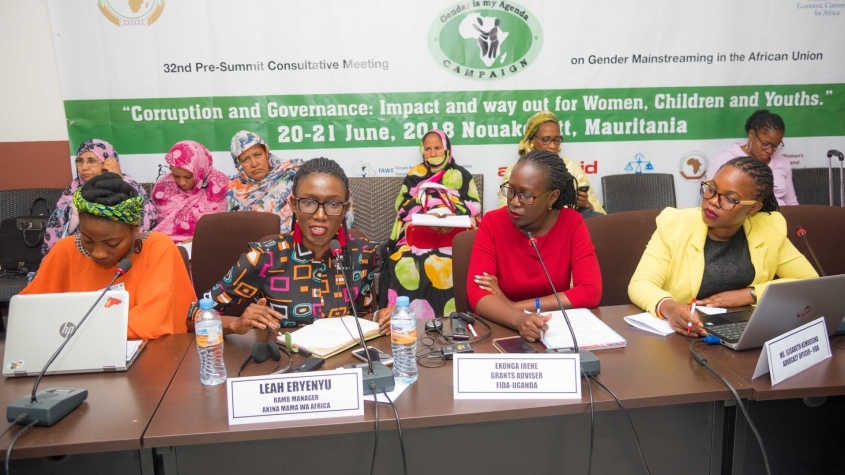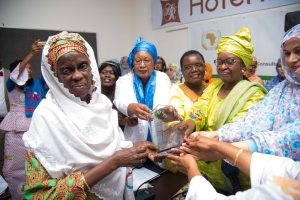
In June, Akina Mama wa Afrika joined other organizations on the continent to collectively identify strategic ways to tackle corruption and underscore how it impedes the realisation of women’s rights at the 32nd Gender Is My Agenda Campaign meeting which took place in Nouakchott, Mauritania. The GIMAC is a Pre-Summit Consultative meeting whose recommendations feed into the African Union Assembly of Heads of State and Government, and “aims to create a space for civil society to monitor the implementation of the Solemn Declaration on Gender Equality in Africa (SDGEA).”
This year’s theme “Corruption and Governance: Impact and way out for Women, Children and Youths” looked to tackle the vice that has crippled good governance, service delivery, stability, and development on the continent. According to Afrobarometer’s 2015 People and Corruption- Africa Survey, “nearly 75 million people in Sub-Saharan Africa are estimated to have paid a bribe in the past year – some to escape punishment by the police or courts, but many are forced to pay to get access to the basic services that they desperately need, a great number of these population being women.”
Women and girls who are victims of sexual violence are usually further re-victimised and exploited in part because of a bureaucratic and inaccessible justice system that encourages the giving of bribes to navigate.
The meeting raised a raft of issues some of which included the exacerbation of sexual violence against women and girls, and the fuelling of trafficking in persons and exploitation of migrant youth as a result of corruption.
Women and girls who are victims of sexual violence are usually further re-victimised and exploited in part because of a bureaucratic and inaccessible justice system that encourages the giving of bribes to navigate. For example, a Police Officer may ask for a bribe to avail an evidence collection form which is a pre-requisite for a case to be heard in court. The victim can choose to pay or, as happens in many cases, give up on the case altogether when unable to afford the bribe requested. Other instances show that a perpetrator can pay the Police Officer to look the other way or case files mysteriously go missing. Consequently justice for women is frustrated, sowing mistrust with public institutions and preventing women from reporting cases of sexual violence.

Research Advocacy and Movement Building Manager, Leah Eryenyu represented Akina Mama wa Afrika at the event.
Akina Mama wa Afrika represented by Research Advocacy and Movement Building Manager, Leah Eryenyu was privileged to be part of a panel discussion constituted by FIDA-Uganda on the impact of corruption on youth migration. Again, the issue of bureaucratic and stringent processes came up, this time in the form of draconian immigration policies that severely limit the crossing of borders, forcing youth to use illegal means to gain entry. This leaves them as perfect fodder for exploitation and trafficking. Consequently thousands of African youth have died at sea and while crossing deserts as they have tried to bypass legal migration channels. Others have ended up in indentured servitude, forced to work as domestic workers in the Gulf States with little or no pay while others have been forced into sex work. With no legal paperwork to support their stay in their adopted countries, it is difficult to seek help from authorities, and the exploitation continues.
The panel discussion made a number of recommendations to curb youth migration and also urged states to recognise the urgency of the problem of human trafficking on the continent. The recommendations were adopted in the final outcome document from the meeting urging states to “Consider the establishment of a High-Level Panel to inquire and report to the January 2019 African Union Summit on causes and mitigation of forceful migration and vulnerability of youth and women to transnational human trafficking criminal syndicates.”
The highlight of the event was the recognition of the indomitable Aissata Toure Kane, who was the first woman ever to be appointed Cabinet Minister in Mauritania in 1975. Her illustrious career has been dedicated to promoting the rights of women. During her time in cabinet, amid great opposition from religious leaders, Kane introduced a program that aimed to reduce the rate polygamous marriage.

Aissata Toure Kane, a Titan of women’s rights, was recognised for her tireless and radical work.
The GIMAC was attended by about 200 representatives from Civil Society Organizations across the African Continent. It ended on a high but contemplative note as participants felt encouraged that corruption had been flagged as an issue of concern but were also cognizant of the immense and time consuming work that is going to be required to root out the vice.

